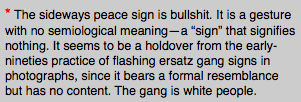I am officially not a New Yorker anymore, since A) I don’t live there and B) the city has added a tourist attraction since I left. The Astor Place Building was bad enough, but now that the 9/11 memorial is finished I have to accept that my mental map of the city is not only imprecise, like a dream, but inaccurate, like the dream where Catherine Keener says I’m pretty. It’s fitting that it should happen this way. The September 11th attacks—more specifically, the baffling torrent of people who did not live in the city on September 11, 2001 but still consider 9/11 a personal tragedy—were what made me feel like a New Yorker in the first place. The feeling is an odd mixture of loyalty and cynicism, which you can simulate for yourself after the jump by reading a quote from this New York Times article.
Tag Archives: new york times
Geoff Dyer puts Michael Fried, academic writing on blast
Holy crap, you guys: Geoff Dyer, author of the masterful Out of Sheer Rage and a bunch of other rad books, now has a regular column in the New York Times Book Review. His inaugural piece is a brutal assessment of academic writing as perfected by Michael Fried, whose Why Photography Matters as Art as Never Before tells you what you need to know about the author’s prose pretty much from the title. If you take out the adverbial clauses, you’re left with “Photography Matters.” Also, when we’re talking about photography mattering as never before, we’re looking at a window of about 170 years, since it definitely did not matter before the invention of the daguerrotype camera. These flaws distract from the big fissure, though: Fried’s borderline compulsive tendency to say what he will set out to accomplish, recap what he has argued, explain what he is not saying, et cetera. Dyer does a fine job of eviscerating this convention of academic and critical writing, and in doing so indirectly indicts the cornerstone of writing instruction: the thesis statement.
Friday links! Satisfactions of elitism edition
Now that the nation has been conveniently divided into Real Americans and everyone I know, and now that the former group has run proud and jiggling through the finish tape of electoral democracy, it’s time to face facts: elitism is cool again. Arch misanthropy is cool again. Sarcastically agreeing with the ignorant might even be cool again. It must be, because such people appear to be winning. What makes elitism uncool is that the elitist is—by definition if not in contemporary practice—winning. Making fun of the dumb and inexpert therefore looks an awful lot like gloating. There’s only one time when elitism is cool, and that’s when general stupidity attains such a supermajority that it overcomes its natural limitations and starts running society. Friends, now is one such historical moment. The retiring middle class and the sons of congressmen have wrested government from the insiders who run Washington, wrested discourse from the nebbishes who spend all day following the news, and wrested history from the eggheads who wasted years learning about it. They had TV already, so that’s pretty much everything. The people have spoken, and they have chosen themselves and/or whomever can convincingly mimic them as the wisest members of society. We humble minority will have to obey them, but we are allowed to make fun. Once you’re losing, that’s your prize. Won’t you snipe bitterly with me?
Missing laptops a portrait of Iraqi corruption
In our general dissatisfaction with the vagaries of American government—stuff like this, for example—we sometimes forget what a genuinely nonfunctioning state looks like. Fortunately, we made one seven years ago. Last week, the New York Times ran this fascinating story about the fate of approximately 8,000 laptops—purchased with $1.8 million of your tax money—donated to the children of Babil. In this case, “donated to,” means “denied to, because they sat in customs for weeks before disappearing.” Don’t worry, though; Iraq’s Commission On Integrity is on the case. “We are still investigating,” an official from the commission told the Times. “We cannot give anymore information now, but soon you will receive a lot of information about this issue.” He forgot to say “my friend,” but presumably that was because he was in a hurry.
Reality versus what we claim to want

The Situation and Professor Plumpers from MTV's Jersey Shore, the highest-rated television show among viewers aged 18-49. Those are possibly not their real names.
Depending on how many Facebook photos exist of you holding up a sideways peace sign,* you probably bring a varyingly complex level of irony to Jersey Shore. The MTV reality show is currently the top-rated television program among Americans 18-49, which makes it perhaps the most valuable commodity on television. Americans aged 18 to 49 buy stuff, as Situation and Professor’s decision to wear necklaces and bracelets to the beach indicates. According to the New York Times, 15 of the 20 top-rated shows for that age group this summer were unscripted—America’s Got Talent, Big Brother, The Bachelorette, So You Think you Can Dance, et cetera. That’s interesting, since in a TiVo poll reported in the same article, reality television was also the genre that the most respondents called “overdone.”
up a sideways peace sign,* you probably bring a varyingly complex level of irony to Jersey Shore. The MTV reality show is currently the top-rated television program among Americans 18-49, which makes it perhaps the most valuable commodity on television. Americans aged 18 to 49 buy stuff, as Situation and Professor’s decision to wear necklaces and bracelets to the beach indicates. According to the New York Times, 15 of the 20 top-rated shows for that age group this summer were unscripted—America’s Got Talent, Big Brother, The Bachelorette, So You Think you Can Dance, et cetera. That’s interesting, since in a TiVo poll reported in the same article, reality television was also the genre that the most respondents called “overdone.”




